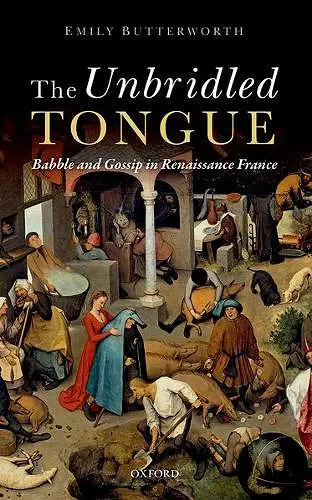The Unbridled Tongue
Babble and Gossip in Renaissance France
Format:Hardback
Publisher:Oxford University Press
Published:11th Feb '16
Currently unavailable, and unfortunately no date known when it will be back

The Unbridled Tongue looks at gossip, rumour, and talking too much in Renaissance France in order to uncover what was specific about these practices in the period. Taking its cue from Erasmus's Lingua, in which both the subjective and political consequences of an idle and unbridled tongue are emphasised, the book investigates the impact of gossip and rumour on contemporary conceptions of identity and political engagement. Emily Butterworth discusses prescriptive literature on the tongue and theological discussions of Pentecost and prophecy, and then covers nearly a century in chapters focused on a single text: Rabelais's Tiers Livre, Marguerite de Navarre's Heptaméron, Ronsard's Discours des misères de ce temps, Montaigne's 'Des boyteux', Brantôme's Dames galantes and the anonymous Caquets de l'accouchée. In covering the 'long sixteenth century', the book is able to investigate the impact of the French Wars of Religion on perceptions of gossip and rumour, and place them in the context of an emerging public sphere of political critique and discussion, principally through the figure of the 'public voice' which, although it was associated with unruly utterance, was nevertheless a powerful rhetorical tool for the expression of grievances. The Cynic virtue of parrhesia, or free speech, is similarly ambivalent in many accounts, oscillating between bold truth-telling (liberté) and disordered babble (licence). Drawing on modern and pre-modern theories of the uses and function of gossip, the book argues that, despite this ambivalence in descriptions of the tongue, gossip and idle talk were finally excluded from the public sphere by being associated with the feminine and the irrational.
This informed, well-researched account of excessive uses of language in the sixteenth century and the early decades of the seventeenth century in France makes a sizable contribution to discussions of nonliterary, popular, and nonelite discourses and their contorted relationship to genteel, literary practices ... One of the important insights made in the book is that "the French public sphere was born from tension and discord and not from the rather genteel Habermasian reasoned discussion" (145) ... Butterworth's book repeatedly reveals its tenacious vitality and political and social usefulness. ... The Unbridled Tongue is an excellent, elaborate account of discordant voices and those of the commentators and critics, the verbal struggle of talking about talk that left some more powerful while excluding others, thus building nonetheless the prehistory of the modern public sphere. * Antonia Szabari, Renaissance Quarterly *
ISBN: 9780199662302
Dimensions: 222mm x 141mm x 20mm
Weight: 418g
250 pages